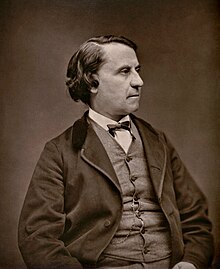This article needs additional citations for verification. (October 2023) |
Louis Blanc | |
|---|---|
 | |
| Born | 29 October 1811 |
| Died | 6 December 1882 (aged 71) |
| Resting place | Père Lachaise Cemetery, Paris |
| Era | 19th-century philosophy |
| Region | Western philosophy |
| School | Socialism |
Main interests | Politics, history, economy |
Notable ideas | Right to work, national workshops |
| Member of the National Assembly for Seine 5 | |
| In office 13 February 1871 – 6 December 1882 | |
| Minister of State | |
| Provisional government | |
| In office 24 February 1848 – 9 May 1848 | |
| Personal details | |
| Political party | The Mountain (1849–1852) Republican Union (1871–1882) |
Louis Jean Joseph Charles Blanc (/blɑːn/ blahn; French: [blɑ̃]; 29 October 1811 – 6 December 1882) was a French socialist politician, journalist and historian. He called for the creation of cooperatives in order to guarantee employment for the urban poor. Although Blanc's ideas of the workers' cooperatives were never realized, his political and social ideas greatly contributed to the development of socialism in France. He wanted the government to encourage cooperatives and replace capitalist enterprises. These cooperatives were to be associations of people who produced together and divided the profit accordingly.
Following the Revolution of 1848, Blanc became a member of the provisional government and began advocating for cooperatives which would be initially aided by the government but ultimately controlled by the workers themselves. Blanc's advocacy failed; caught between radical worker tendencies and the National Guard, he was forced into exile. Blanc returned to France in 1870, shortly before the conclusion of the Franco-Prussian War, where he served as a member of the National Assembly for Seine. While he did not support the Paris Commune, he successfully proposed amnesty to the Communards.